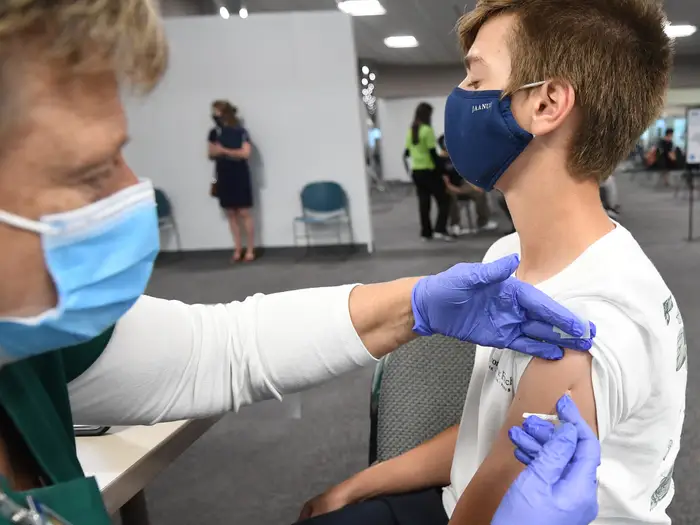US Halts Routine COVID Boosters for Healthy Children and Adults Without New Trial Data
In a major shift in public health strategy, top US health officials have announced they will no longer recommend routine COVID-19 booster shots for healthy children and adults. They say the decision reflects the need for updated clinical trial data before offering more boosters to the general population. This marks a clear shift toward a more focused approach, prioritizing those most at risk from the virus.

Officials from the Centers for Disease Control and Prevention (CDC) and the Food and Drug Administration (FDA) explained that the policy change reflects how the virus and population immunity have evolved since the early pandemic years.
A New Phase in the Pandemic
With COVID-19 now causing less severe illness for most people, health experts say it’s time to update the strategy. Instead of encouraging booster shots for everyone, the US will now concentrate on protecting older adults, people with chronic illnesses, and those with weakened immune systems.
“We’re entering a different phase of the pandemic,” said a senior CDC official. “We no longer believe that giving routine boosters to healthy individuals is the best use of our resources, especially without fresh trial data.”
Although the COVID vaccines still help prevent severe illness and death, studies show that their effectiveness at stopping infection drops over time. Additionally, most healthy children and adults already have some level of protection from earlier vaccinations or past infections. Because of this, officials see little benefit in offering ongoing boosters to low-risk groups without new supporting data.
Prioritizing High-Risk Individuals
Health agencies will now direct booster campaigns toward those who need them most, including:
- Adults over 65
- People with immune deficiencies
- Individuals with chronic medical conditions
- Residents of long-term care facilities
These groups remain at a higher risk for complications from COVID-19. Health experts say targeted boosters will offer the most protection for these vulnerable populations.
Meanwhile, healthy children and younger adults will not receive automatic booster recommendations. Health officials say they need clear, updated evidence before suggesting further doses for this group.
Clinical Trials Will Drive Future Decisions
Moving forward, US regulators want new COVID booster campaigns to rely on strong clinical trial data. The FDA plans to review the effectiveness and safety of future vaccine formulations before approving them for general use.
This approach mirrors how the FDA handles most vaccines and treatments — only approving those that demonstrate clear benefits. Experts say this requirement helps rebuild public trust, especially after years of shifting recommendations and misinformation.
“People respond better when they know science drives the decisions,” said Dr. Leana Wen, a public health professor. “Relying on new trials ensures we’re not just reacting, but following solid evidence.”
Medical Experts React to the Shift
Many in the medical field agree with the decision. They point out that most healthy people now face a much lower risk of serious illness from COVID-19. However, some doctors warn that reducing boosters too much could open the door to new outbreaks, especially if a more dangerous variant appears.
Dr. Eric Topol, who leads the Scripps Research Translational Institute, noted that the virus is still evolving. “We can’t afford to become complacent,” he said. “This doesn’t mean COVID is over — just that we’re adapting to a new reality.”
Pediatricians also expressed mixed feelings. While many agree that young, healthy children don’t need routine boosters, some worry that this change could confuse parents or discourage them from vaccinating their kids altogether.
A Global Trend
This US policy shift may influence other countries. Some nations, like the United Kingdom and Germany, have already scaled back their booster programs to focus on vulnerable populations. Now that the US is following a similar path, other countries may reconsider their own strategies.
Despite the changes, global health leaders stress that COVID-19 remains a concern. The World Health Organization (WHO) continues to track emerging variants and reminds countries to stay alert and flexible.
What to Expect Next
Pfizer and Moderna are currently developing new COVID vaccines that target recent virus strains. They plan to release these updated versions later this year, pending FDA review.
Once those vaccines become available, US health agencies will study the trial results and decide whether to recommend them more broadly. Until then, they urge people at high risk to stay up to date with available boosters.
Health officials also continue to recommend practical steps like staying home when sick, testing when symptoms appear, and using masks in crowded or high-risk areas.
Final Thoughts
The decision to pause routine COVID boosters for healthy children and adults shows a more tailored and evidence-based strategy for managing the virus. Rather than rely on blanket policies, health leaders now want to focus on what the data says and protect the people who need it most.
While COVID-19 still poses a threat, especially to vulnerable groups, the broader population can expect more targeted recommendations based on scientific evidence — not just precautionary responses.






